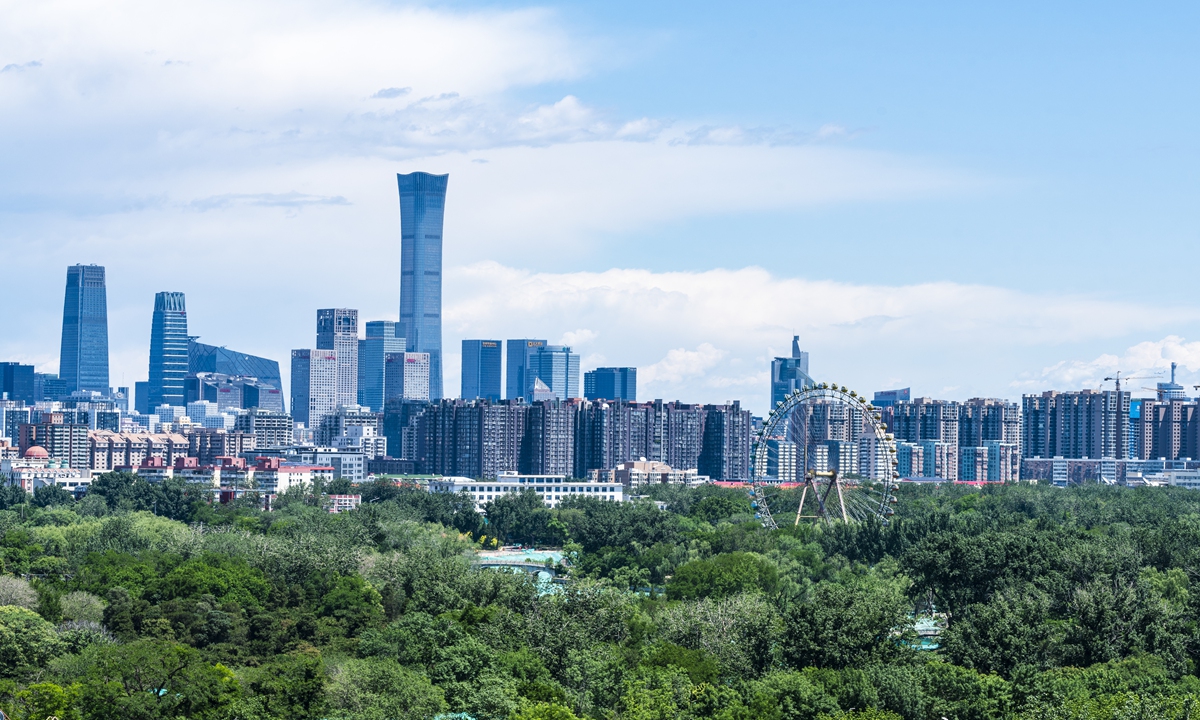
A view of the skyline of Beijing's CBD area Photo: VCG
As 2023 draws near to its close, Chinese people are more or less concerned about the economic prospects next year, including whether it is easier to land a higher-paying job, or the banks will move to cut the mortgage rates further so that they could buy a more affordable home, or the retired could have access to a raise in their pensions.However, like the previous several years, the uncertainties including a lingering correction of China's housing market and a volatile world filled with many geopolitical and geo-economic headwinds, still hang in the air.
At this time last time, China's "grand reopening" after the lifting of the strict "zero-COVID" restrictions coincided with the challenging economic conditions overseas as elevated inflation made consumers to snap shut their pocketbooks and less inclined to buy Chinese goods. At home, Chinese consumers were worried about their home finances and were wary to start spending after the three-year on-again-off-again lockdowns.
However, if 2023 is the mirror, China is most likely to accelerate fiscal and monetary stimulus in order to achieve a comparatively higher economic growth rate next year, which could be set at yearly 5 percent expansion in GDP, a rate necessary to generate much-needed jobs for the young and new college graduates. The National People's Congress (NPC) is expected to approve 3.8 percent or even higher of the GDP as the government asks for more fiscal spending in 2024 to give a significant boost to the economy.
At the same time, the descending of overseas inflationary pressures, particularly in the US, the EU and other major economies, will provide China's central bank more room to pursue a considerably loose monetary policy in 2024, including reductions in the benchmark interest rates and deeper cuts in the commercial banks' required reserve ratios in order to ensure sufficient market liquidity and prevent deflating consumer prices. Consumer prices in November fell 0.5 percent from October, the sharpest drop in almost three years, which reflects weakness in economic activity.
As China's property market is still in the trajectory of a readjustment after two decades of robust growth, it is important for the country's policymakers to find new drivers of economic development. Luckily, the country has in the past several years consistently focused on clean and renewable new energies, including solar panels, wind turbines, nuclear-power generators and batteries, as well as green electric-vehicle manufacturing.
These new industries, supported by China's fairly mature and complicated supply chains, will help prop up the country's economic growth before 2030. For example, more than 46 percent of the state grid's yearly electricity is now contributed by new energy farms and plants, and the country's sprawling EV assembly lines, more than 90 different EV brands offering prices ranging from $5,000 to $100,000, and an estimated 8.4 million EV sales this year, are winning the country unparalleled edge in global competition.
Years ago, the policymakers viewed EVs as a pathway for sustainable transportation because of their low carbon dioxide emissions and high energy efficiency. Now the green sector could largely make up for the lag caused by the housing sector correction.
And, during the high-level Central Economic Work Conference held in December in Beijing, the policymakers set their eyes on high-tech innovations that will lead China's next-phase efforts toward realizing faster modernization. The meeting called for reinforced efforts to promote the country's industrial and service sector upgrades through consistent innovations in science and technology, and in particular, to forge new levers of growth and seek more advanced business models that are backed up with cutting-edge or disruptive new technologies, such as breakthroughs in digital domain explorations, artificial intelligence and deepening automation.
It is almost certain that more resources will be diverted to nurturing newer and stronger buoys of productivity in 2024, backed up with Huawei's 5G solutions covering all digital work platforms in the country, serving the first (agricultural), the second (mining and manufacturing) and the third (tertiary) industrial lines. And, Huawei and other Chinese tech companies' new attainments in advanced autonomous driving systems and generative AI solutions are expected to be widely adopted. Also, China's traditional manufacturing advantages in making digital devices, home appliances, satellites, ships and high-speed trains will be constantly shored up in 2024.
By all metrics, Chinese policymakers are far-sighted and even prophetic that only fixating on constant technology innovations could spearhead the country's long march towards modernization and shore up the country's comprehensive national strength, which will enable China to climb the prosperity ladder while have the capacity to help other developing countries grow through BRI and other initiatives.
It is true that the real estate sector correction has impacted this year's economic growth, as a number of developers faced default risks. From January to November 2023, the total commercial housing sales was 1,005 million square meters, down about 8 percent year-on-year, with the overall sales revenue for commercial property being 10.53 trillion yuan ($1.36 trillion), down 5.2 percent year-on-year. Experts say the saturation of housing demand at the market is due to such factors as the subdued confidence, the aging population and low fertility rate. Given the current economic situation, it is necessary and also imperative to stabilize the real estate market in order to ensure continued growth.
In 2024, the government is expected to facilitate the sector's development by extending easier loans to the developers and encouraging home purchases by further reducing the mortgage rates. The property sector accounts for about 30 percent of the GDP and more than 60 percent of household wealth, so it is of great importance to stabilize and rejuvenate the industry.
To boost housing demand, the first-tier megacities such as Beijing and Shanghai moved to reduce the eligibility requirements for "first-time" homebuyers. Under the new policy, households or individuals will be considered first-time homebuyers and can apply for housing loans as long as no member of the households or the individuals own any property in the city of purchase, regardless of whether they have previously got a home loan or have any loan records.
The International Monetary Fund (IMF) estimates that China's economy will rise by 5.4 percent in 2023. There are varied expectations for the economy's growth next year. Given the government's proactive move of doling out one trillion yuan of special treasury bond issuance in December to ratchet up disaster resistance ability and infrastructure investment, it is widely believed that more and stronger fiscal and monetary stimulus measures will be worked out to prop up economic growth in 2024.
The author is an editor with the Global Times. bizopinion@globaltimes.com.cn



